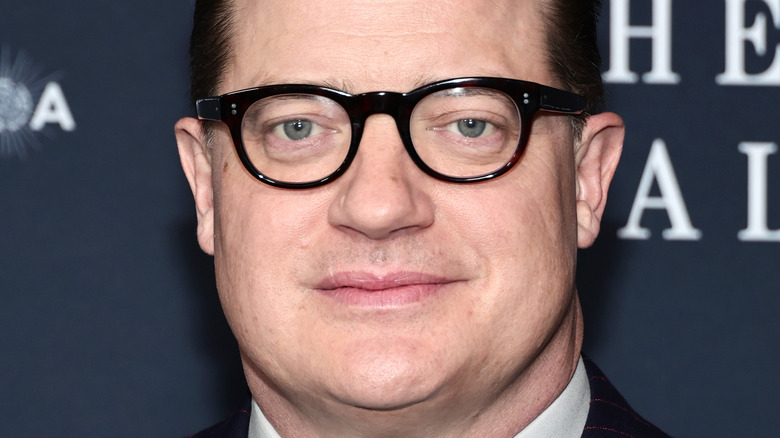Batgirl Directors See A Glimmer Of Hope In Brendan Fraser's Oscar Buzz
The cancellation of HBO Max and DC's "Batgirl" film is still very much on the mind of directors Adil El Arbi and Bilall Fallah. The pair were notified that the streaming feature — which was in the final stages of production — would be axed at El Arbi's wedding, almost immediately before the news broke publicly. It was a surprising move, not least of all because it was rumored to be due to an unimpressive final product. After all, the film was helmed by two increasingly prominent directors with experience in the comic book space and starred Michael Keaton, J.K. Simmons, Brendan Fraser, and "In The Heights" breakout star Leslie Grace.
Fraser — whose career has seen a dramatic renaissance among fans, critics, and creative heads — is currently expected to receive an Oscar nomination for his transformative performance in A24's "The Whale." If he does, the "Batgirl" directors feel that his increased star power may be the last hope for their film to see the light of day.
Speaking to Deadline at the controversial Red Sea International Film Festival, the directors stated in no uncertain terms that there was nothing they could do to release the film. El Arbi offered, "When you see Brendan Fraser, who's maybe going to win an Oscar for 'The Whale,' it's like maybe that's going to help us out because he gave an Oscar-winning performance." Chances of a release remain slim-to-none, with many fans still wondering why the studio would cancel a ready-to-watch film.
How bad was Batgirl if the studio won't release the finished film?
A persistent misconception about "Batgirl's" cancellation is that the film was finished. Popular comic book movie journalist and content creator Matt Ramos — aka @therealsupes — shared to his following, "DC ... just canceled a finished Batgirl movie" as part of a longer tweet comparing the DC and Marvel fanbases. Ramos is far from the only person who had this perception of events, as the pervading narrative at the time painted the film as ready to screen.
While it's true that Warner Bros. made a controversial move by canning a film as close to completion as "Batgirl" was, it simply wasn't finished. Adil El Arbi told Deadline, "There was still a lot of work to be done, but they just said it was financial decisions and so that's that and the movie can never be released." Though El Arbi and others have dismissed the decision as purely financial, it hasn't stopped some from assuming the film would've been poorly received if released.
Another misconception plaguing this discussion is that the film turned out to be so definitively lacking in quality that it was unreleasable. One Twitter user wrote, "I wonder how bad the batgirl film was for the studio to axe it entirely after a test screening." While the film did score in the 60s in its first test screening, the score itself isn't a reliable arbiter of quality on its own. As The Hollywood Reporter notes, "It" had a similar score and went on to make over $700 million. Then again, the idea that "Batgirl" was somehow less-than compared to other DC offerings is a notion that arguably came from the Warner Bros. CEO himself.
Was Batgirl a critical or commercial risk?
As reported by Variety, Warner Bros. President and CEO David Zaslav implied during an earnings call that the film was not satisfying studio higher-ups: "We're not going to launch a movie to make a quarter and we're not going to put a movie out unless we believe in it." While it's certainly valid to take Zaslav's words at face value, some key contextual factors are worth noting.
Quarterly earnings calls are typically an opportunity for executives to project confidence and ease the minds of investors — especially during periods of turmoil or transition. Implying that the studio is canceling films because they're more qualitatively discerning than their predecessors who green-lit the film likely sounds strong to a disparate array of investors. It can't be known for certain if Zaslav's decision was informed more by critical or commercial anxieties. It's also worth noting that in the same call, Zaslav used "Black Adam" as an example of then-future films he felt were "terrific" and would be successful for the company. As of writing, "Black Adam" has underperformed critically and commercially.
That being said, the only way "Batgirl" could have recouped its sizable budget was by attracting more HBO Max subscribers (Per The Hollywood Reporter). In the eyes of studio heads, $90 million may have been too much to risk for such a reward. By cutting their losses and turning the film into a tax write-off, Zaslav may have saved the company from a critical financial blow during a time of uncertainty. In a future, stronger, DC cinematic universe, perhaps there will be room for "Batgirl" to finally step into the light. If it was as disappointing as Zaslav and others have implied, however, the film may be doomed to the dark for good.


